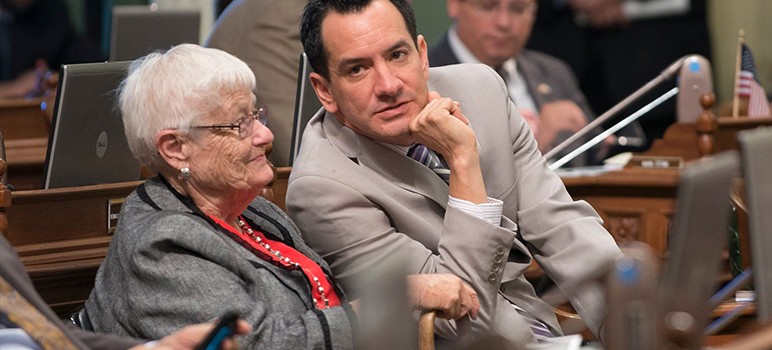Reasonable people agree that the infamous "kill the gays" bill is an affront to society, hateful piffle from some reclusive Bible-thumping attorney. Deplorable as it was, the “Sodomy Suppression Act” Matt McLaughlin proposed for the state ballot has managed to spark healthy discussion about the citizen initiative process.
First, Silicon Valley Assemblyman Evan Low (D-Campbell)—who’s quick to note that initiatives are an important expression of direct democracy—suggested raising the filing fee from $200 to $8,000 to get people to take it seriously.
Activists like San Jose’s Joe Decker and Los Angeles-based Charlotte Laws each submitted counter-initiatives, the “Shellfish Suppression Act” and the “Intolerant Jackass Act” respectively, effectively using the legislative mechanism to fight speech with speech. For her part, Laws thinks the initiative system should remain accessible to the general public, affordable and, yes, even prone to ridiculous ideas like McLaughlin’s.
But one Southern California lawmaker says the Attorney General’s Office, which is legally tasked with reviewing citizen-submitted legislative ideas, should at least have the option of giving the public a heads up if those proposals are potentially unconstitutional.
AB 884, introduced by Anthony Rendon (D-Lakewood), would authorize the attorney general to label bills that might violate anyone’s constitutional rights. That label would be affixed to signature-gathering petitions, so anyone with a clipboard soliciting autographs would have to display the red flag.
Rendon suggests labeling bills like McLaughlin’s, which called for the vigilante slaughter of gay people, with the following fine print:
“The Attorney General has determined that this initiative measure, if approved by the voters, would likely result in a violation of an individual’s rights under the United States Constitution or the California Constitution.”
A warning like that would have come in handy leading up to the passage of Proposition 8, which California voters approved in 2008 and a federal appeals court struck down after ruling it unconstitutional four years later.


The AG should have the same authority for legislative action.
Yes, yes, yes!
Actually California Attorney General Jerry Brown did just that rewrite legislation he didn’t like so that it would be voted down by the electorate. I don’t recall what it was at this time, but I thought it was rather over stepping the bounds of his office, much as running for a third and fourth term as governor!
Rufas Reed may not have been successful with Measure B had the largely uninformed masses of San Jose been told it was illegal. Oh wait, I forgot that all the employee associations did exactly that!
Jealousy and oft-repeated lies triumph over fact and reality in local politics.
Proposition 8 cannot be compared with this Kill the Gays initiative. It was very reasonable, it was in accordance with millennia of history, and it won. It took very creative thinking to find it “unconstitutional “.
Such a procedure can never be performed by an elected official, because it will invariably be politicized by members of both parties. Kamala Harris has already proved the point.
What if this was all just a false flag to indenture our elected offices and political processes to the wealthy? I mean really, this “Kill the gays” bill is just too outlandish to be taken seriously by anyone.
The problem is, no matter how outlandish it may seem to reasonable people, not everyone is reasonable. After all, this one apparently attracted enough signers to qualify for the ballot, which means either people thought it was a joke, or there really are that many mean-spirited people in this state to make the threat real. Sad, isn’t it?
I like our initiative system, and it leads to some kinda creative political theater, like the fellow who responded to Prop 8 by starting to gather signatures for his initiative to defend the sanctity of marriage – by banning divorce! If the cost goes up, that sort of thing is lost. I doubt it would affect serious initiatives – if they can’t raise $8,000, they probably can’t raise the required number of signatures, let alone the votes necessary to pass.
You’re right. Too outlandish.
We don’t even have Islamics here.